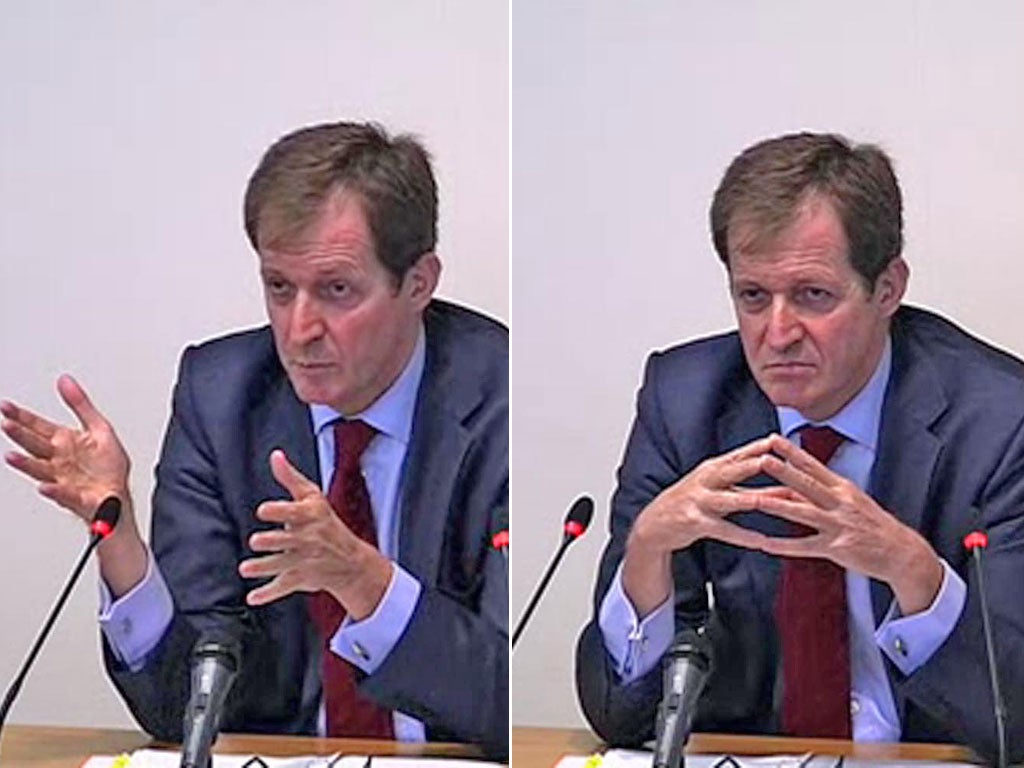Alastair Campbell denies No 10 'deal' with Rupert Murdoch
Relationship with News International was all above board, says ex-Labour spin doctor

Your support helps us to tell the story
From reproductive rights to climate change to Big Tech, The Independent is on the ground when the story is developing. Whether it's investigating the financials of Elon Musk's pro-Trump PAC or producing our latest documentary, 'The A Word', which shines a light on the American women fighting for reproductive rights, we know how important it is to parse out the facts from the messaging.
At such a critical moment in US history, we need reporters on the ground. Your donation allows us to keep sending journalists to speak to both sides of the story.
The Independent is trusted by Americans across the entire political spectrum. And unlike many other quality news outlets, we choose not to lock Americans out of our reporting and analysis with paywalls. We believe quality journalism should be available to everyone, paid for by those who can afford it.
Your support makes all the difference.The content of key phone calls between Rupert Murdoch and Tony Blair in the run-up to the Iraq War could not be recalled by Alastair Campbell at the Leveson Inquiry yesterday.
Downing Street's former director of communications, who kept a meticulous diary which chronicled the Blair years in Downing Street, told the Inquiry he "could not remember" specific details about three calls Mr Blair made to Mr Murdoch before the US-led war in 2003.
He said the idea that the then Prime Minister could not have pursued his policy in Iraq without the backing of Mr Murdoch and The Sun was "complete nonsense", and dismissed the significance of the phone calls. Most non-Murdoch papers were against the war and so Downing Street would have "appreciated the support" of Murdoch titles, he added.
Appearing before the Inquiry for the second time, Mr Campbell claimed Labour did not cut a "deal" with Mr Murdoch in the run-up to their 1997 election win. A former political editor of the Daily Mirror, he was hired by New Labour in 1994 to marshal the party's media operations.
Mr Campbell was questioned about his early years working with Mr Blair. He said for New Labour it would have been "lacking good sense" not to have developed a relationship with Mr Murdoch, but added: "I never was witness to, and I don't believe there was ever a discussion that said, 'Now, Tony, if you do this and do this and do this my papers will back you' – it just never happened."
The Government looked at issues "on their merits", he told the inquiry, adding: "The Sun backed us because we knew we were going to win, we didn't win because The Sun backed us." He continued: "There are lots of areas where you'd be hard-pressed to say the Murdochs were getting a good deal out of the Labour government."
The Inquiry's leading counsel, Robert Jay, QC, questioned Mr Campbell with a tall pile of biographies linked to the Blair years beside him, with Mr Campbell's own diaries among them. Although he acknowledged the No 10 press office had fed The Sun stories, he said this happened with other papers. "Every single paper thought we favoured other papers," he said. "You couldn't win."
Meanwhile, one of Rupert Murdoch's former closest lieutenants, Les Hinton, criticised MPs who accused him of "selective amnesia". Earlier this month the House of Commons Culture, Media and Sport Committee claimed the former chairman of News International had misled Parliament and was "complicit" in a cover-up of phone hacking at the News of the World. In a detailed response to the committee's chairman, John Whittingdale, yesterday, Mr Hinton said the findings "were based on a misreading of evidence, and on a selective and misleading analysis of my testimonies to your committee".
Lost in thought: who forgot what
Alastair Campbell is not the first at Leveson to struggle with his memory. Robert Jay, QC, raised "selective amnesia" as a possible explanation for Rupert Murdoch's sketchiness on a meeting with Margaret Thatcher (News International disputed this yesterday). Rebekah Brooks could not remember who brought up the BSkyB deal at a dinner with George Osborne. Andy Coulson could not recall if David Cameron's chief of staff spoke to him about the convictions of Clive Goodman and Glenn Mulcaire. Ex-News Corp grandee Les Hinton, in front of MPs in November, said he could not remember the details of key events in the hacking scandal. And James Murdoch was foggy on the decision that The Sun would back Cameron.
Brooks to learn whether she faces criminal charges over hacking
Rebekah Brooks, the former chief executive of News International, will be told this morning whether she will face criminal charges relating to phone hacking, police bribery and conspiring to pervert the course of justice.
Six other suspects linked to phone hacking are also expected to learn if they face criminal proceedings. The Metropolitan Police are understood to have already passed files to the Crown Prosecution Service.
Ms Brooks, left, who was arrested on 13 March as part of Operation Weeting, was questioned for over five hours at the Leveson Inquiry.
Subscribe to Independent Premium to bookmark this article
Want to bookmark your favourite articles and stories to read or reference later? Start your Independent Premium subscription today.